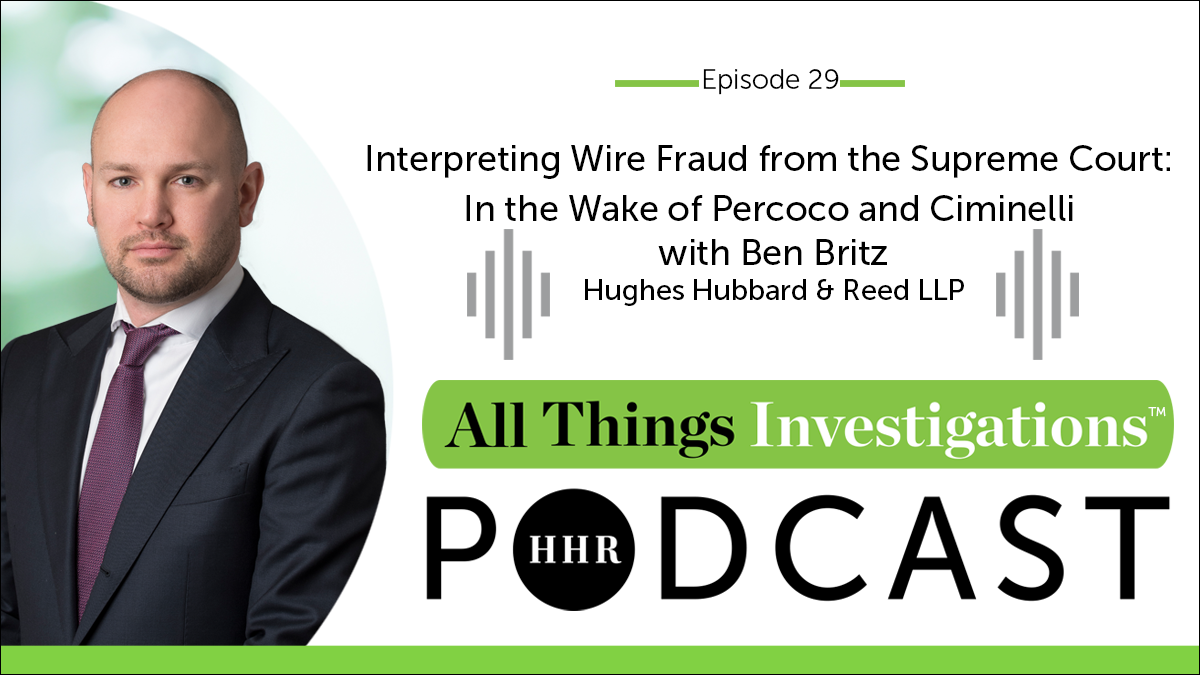
In this award-winning All Things Investigations episode, Tom Fox hosts Benjamin Britz to unpack two high-profile wire fraud cases reshaping how fraud convictions are viewed. Their conversation explores the Cuomo administration cases – Percoco and Ciminelli – providing in-depth analysis of the unanimous Supreme Court decisions and highlighting their broader implications on applying the wire fraud statute.
Ben Britz is a partner at Hughes Hubbard & Reed and an expert in the legal complexities regarding financial fraud. His analysis helps shape a clearer understanding of legal precedents, providing invaluable context to legal practitioners and interested observers.
You’ll hear Tom and Ben discuss:
- Ben recently wrote a “client alert” article, Hanging by a Thread: Unanimous Supreme Court Snips Back Two Wire Fraud Convictions. The article discusses two high-profile wire fraud cases related to the Cuomo administration in New York, the Percoco and Ciminelli cases.
- These cases examine the legality of influence exerted in government and the implications of bid rigging.
- In the Percoco case, Joseph Percoco, a senior advisor to Governor Cuomo from 2011 to 2018, was charged with honest services fraud after he was paid $35,000 to lobby an arm of the New York state government on a labor dispute related to a real estate holding. The case raises questions about the legality of such actions when the individual is technically not in government service.
- The Ciminelli case involves bid rigging, where Ciminelli and a third party manipulated the qualifications for a project’s bidding process so that only Ciminelli’s company could win. The case raises questions about the “right to control” theory and whether withholding information influencing decision-making amounts to fraud.
- The Supreme Court has demonstrated a trend of a strict interpretation of wire fraud statutes, often reigning in attempts to expand the application of these laws. Tom and Ben discuss two Supreme Court decisions that pushed back on the expansion of wire fraud statutes, emphasizing a focus on the statutory language.
- The Department of Justice’s positions in the Percoco and Ciminelli cases were unusual, as they only partially defended the charges.
- The DOJ admitted that the right-to-control theory was misapplied in the Ciminelli case and agreed that the jury instructions in the Percoco case were based on outdated law.
- The Supreme Court rulings in these cases put a greater onus on prosecutors to charge cases correctly according to the specific wording of the statute. This includes ensuring the facts align with the charge and not pursuing novel interpretations of the wire fraud statute.
- The ramifications of these rulings may impact future cases and how prosecutors and defense attorneys approach wire fraud charges.
- Understanding where the legal boundary lies is crucial, especially for those engaged in political activities, lobbying, and public bidding processes.
KEY QUOTES:
“But I think it’s also these are two weird cases in that in both of them, the DOJ takes a very odd position where it only sort of half defends its case.” – Benjamin Britz
“The Court is getting fairly tired of it, and they want these statutes to be read and interpreted as they’re written and charged in that way.” – Benjamin Britz
“Isn’t it possible that someone can be not in government but still have enough control over what the government is doing that bribing them is illegal?” – Benjamin Britz
Resources:
Hughes Hubbard & Reed website
Benjamin Britz on LinkedIn


